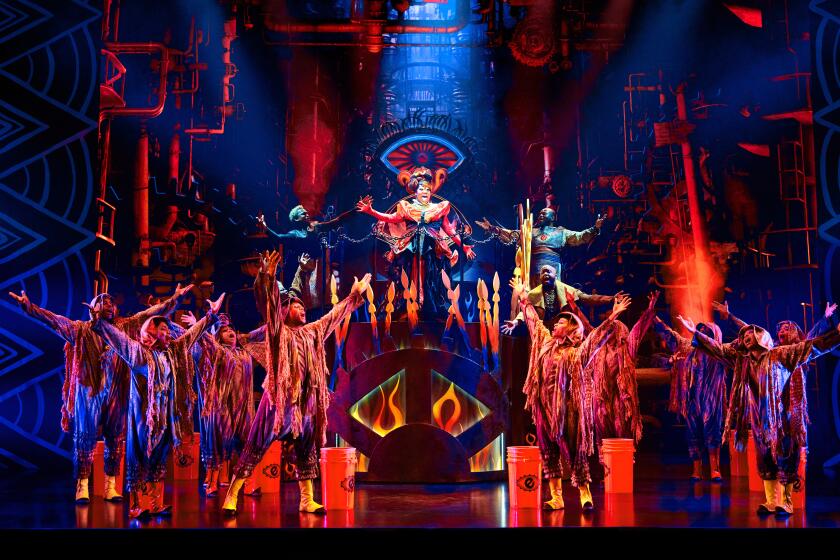Review: History haunts the characters of ‘Black Cypress Bayou’ at the Geffen Playhouse
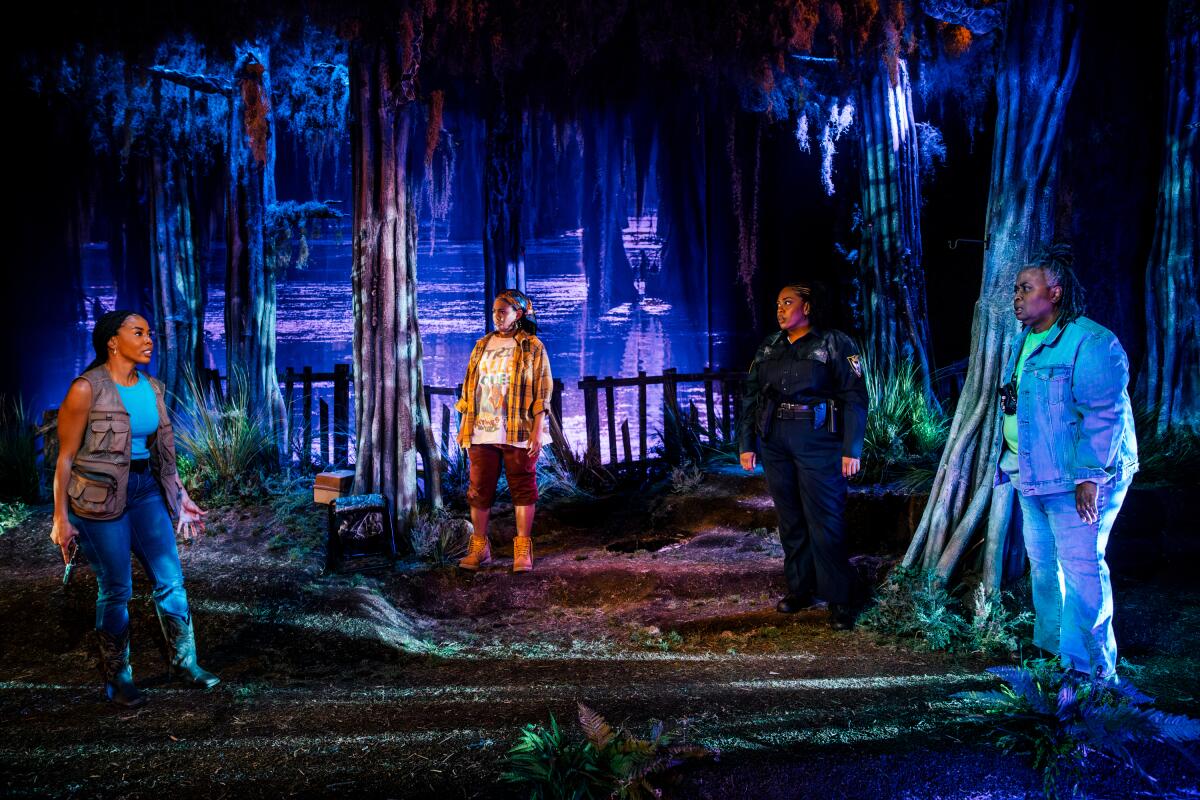
“Black Cypress Bayou,” the intriguing new play by Kristen Adele Calhoun at the Geffen Playhouse’s intimate Audrey Skirball Kenis Theater, is set in the marshy woods outside of Lodi, Texas.
The scenic design by Lawrence E. Moten III re-creates this soupy milieu so vividly that I found myself swatting away invisible mosquitoes. Spanish moss hangs from branches of black cypress trees like funeral veils. Slow-moving brackish water, threatening to swallow whatever comes near, menaces in the background.
LadyBird Manifold (Brandee Evans) is at home in this forsaken spot, but she doesn’t understand why her mother has arranged an emergency night fishing expedition in the middle of the pandemic. She’s a stickler for COVID safety protocols and doesn’t want to be in close contact even with her nearest and dearest.
Her antenna for trouble is up. Not only is Vernita Manifold (Kimberly Scott), LadyBird’s mother, splattered in blood, but she whips out a knife at the sound of approaching footsteps. Clearly, something’s rotten in the swampy state of Texas.
Before she can explain what’s going on, Vernita insists that LadyBird call her sister, RaeMeka Manifold-Baler (Angela Lewis). She needs RaeMeka, because, as she says, LadyBird is too “by-the-book” — meaning too eager to conform to “white folk” rules and regulations.
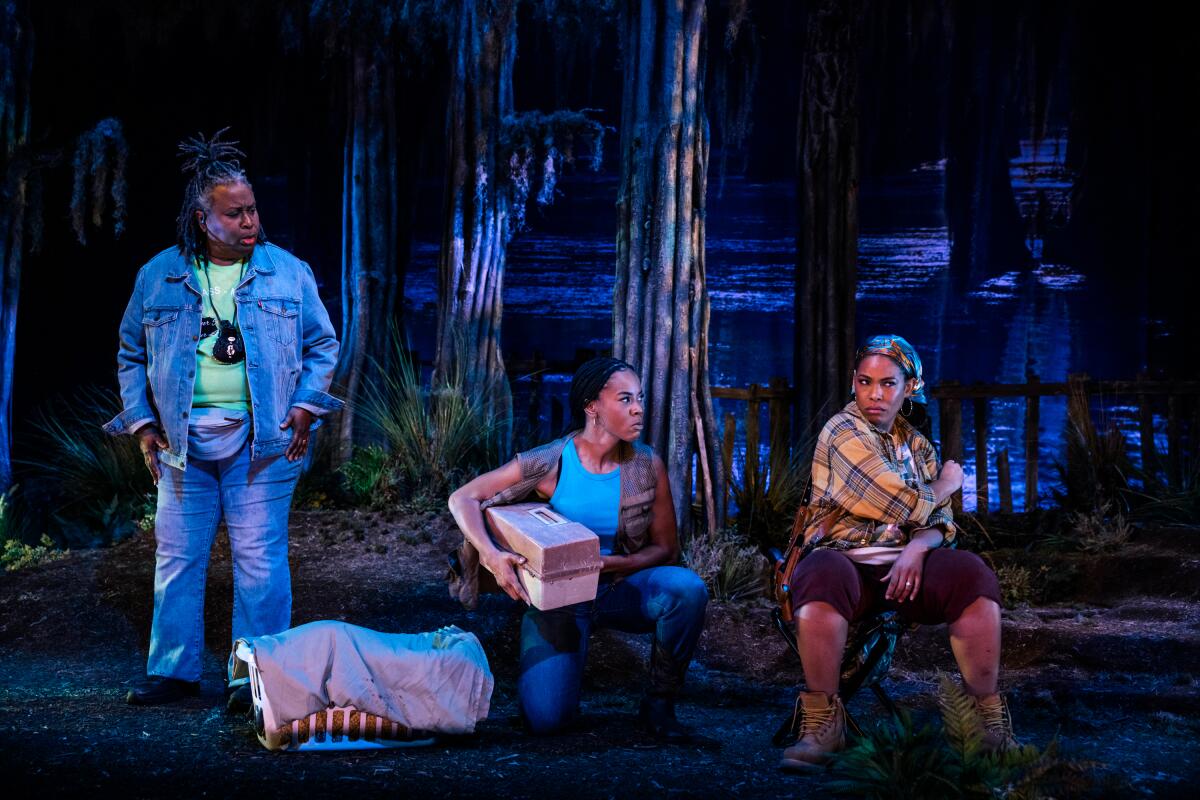
The mystery of this family meeting lies in a laundry basket Vernita has carted over from the house. Covered in a towel is the decapitated head that once belonged to Clayton Rutherford, the richest man in East Texas.
How Old Rutherford’s head got severed from his body is a question that all three family members want answered. But in the meantime, they don’t want to be implicated in a crime against a powerful white man they know the authorities will be vehemently pursuing.
So why not just call the police and explain that the head turned up on Venita’s back porch? LadyBird’s question infuriates both her mother and her sister with its obtuseness.
“Considering they do most of the killing you must want me laid up dead next to him?” Vernita asks. “What I look like calling the death squad to my own door? And on account of a dead white man? I know I raised you better than that, Lady. We don’t ever call the police. Not for nothing.”
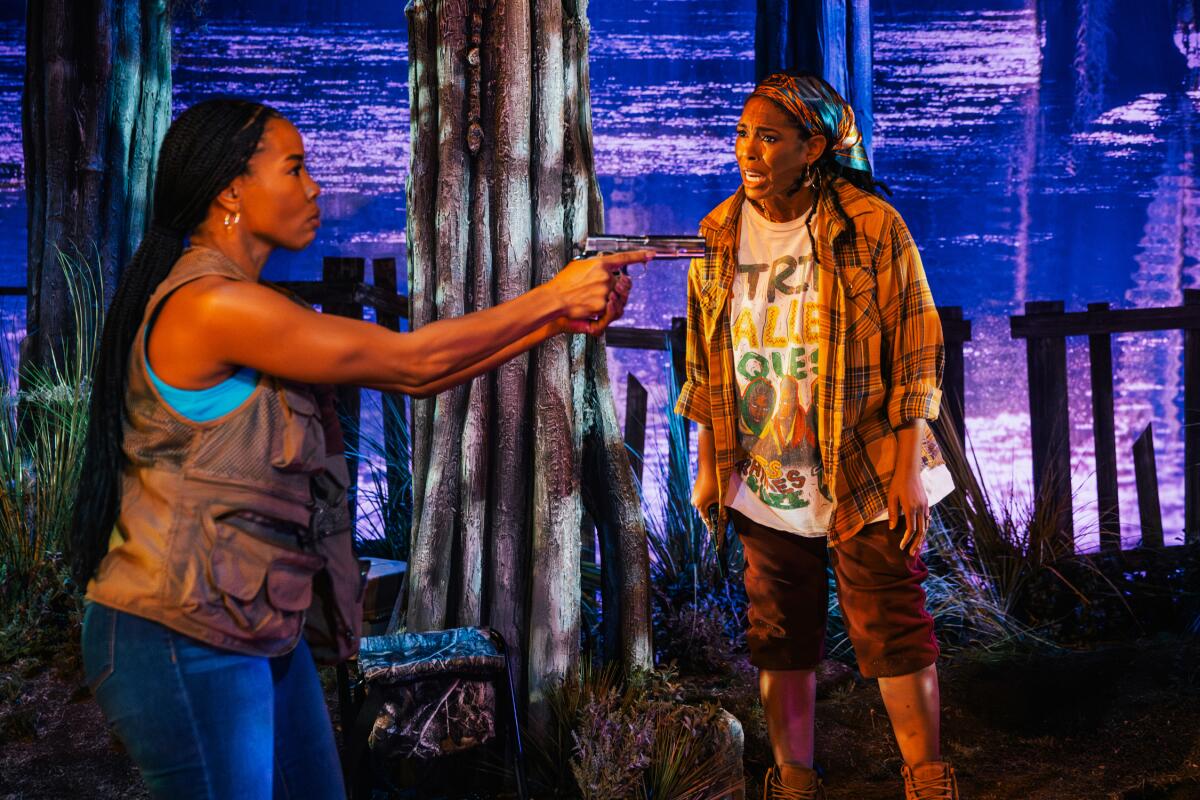
The moment is played for laughs but tragedy lurks below the humor. At first it’s not clear if “Black Cypress Bayou” intends to be dark comedy in the Martin McDonagh vein. The sight of a chopped off head bandied about like a hot potato is one that the author of “The Pillowman,” “The Cripple of Inishmaan” and “The Lieutenant of Inishmore” would be right at home with.
Like McDonagh, Calhoun locates her play in a world cut off by geography. The language of the characters reflects their remoteness, as does their cynicism toward law and order. Time has taught them that no one is coming to their rescue.
But “Black Cypress Bayou” only flirts with gallows humor and bloody farce. Its real concern is history and the prospect of reparations. Dreamlike, the play imagines how restitution might come to pass with help from lynched ancestors, whose souls hover, waiting for justice.
More than from McDonagh, Calhoun is taking her inspiration from a long line of Black female novelists — from Toni Morrison to Jesmyn Ward — who reanimate the dead for the sake of the living. “Black Cypress Bayou” is a ghost story in which history itself is haunted.
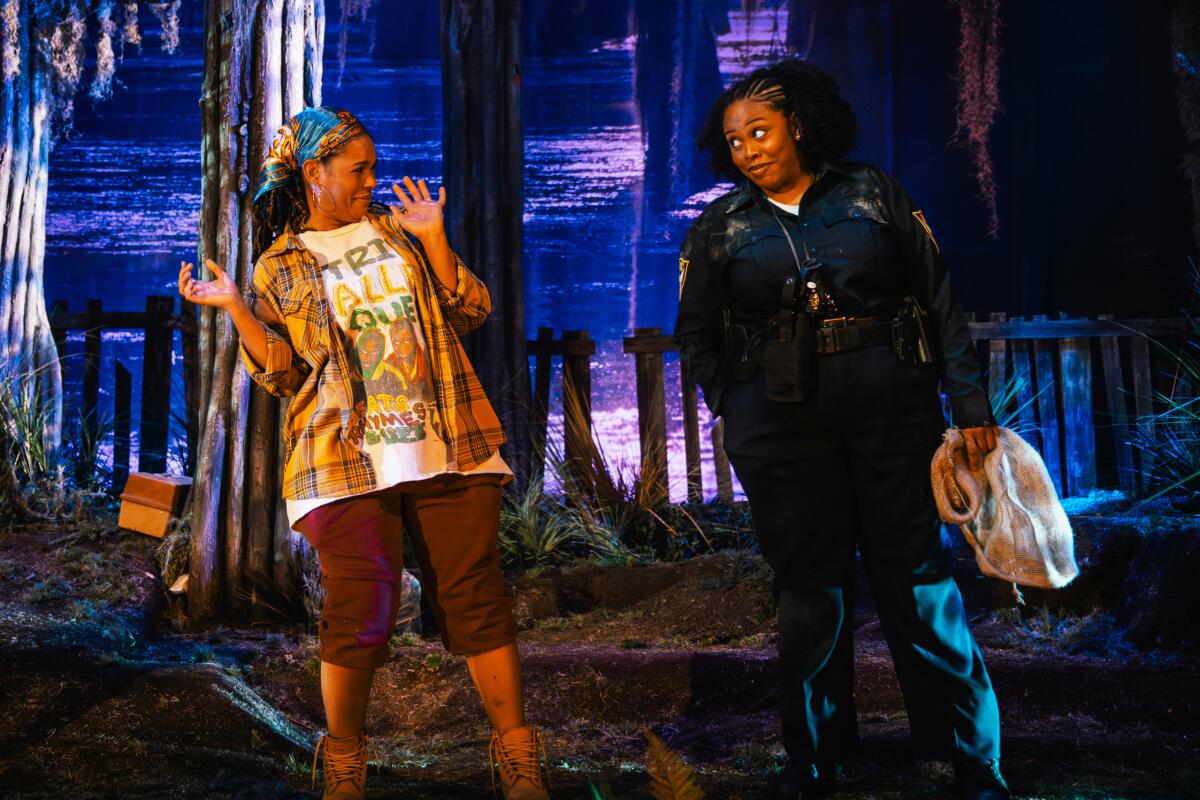
When Taysha (Amber Chardae Robinson), a mysterious character with a secret connection to Vernita, enters the story, the comic family squabbling gives way to a serious reckoning with the past. For Vernita and her daughters, the occult is less threatening than everyday reality.
Neither the play nor the production feels completely settled at this point. Calhoun still seems to be discovering her characters and fleshing out the through line of a plot that can sometimes seem as overgrown as one of the black cypress trees.
The actors, under the direction of Tiffany Nichole Greene, inhabit their characters with total commitment. But the production on opening night had the choppy quality of a workshop.
Scott delivers a powerhouse performance, despite having to occasionally grope for a line that isn’t immediately in reach. She makes Vernita’s upside maternal morality seem both nurturing and bayou savvy.
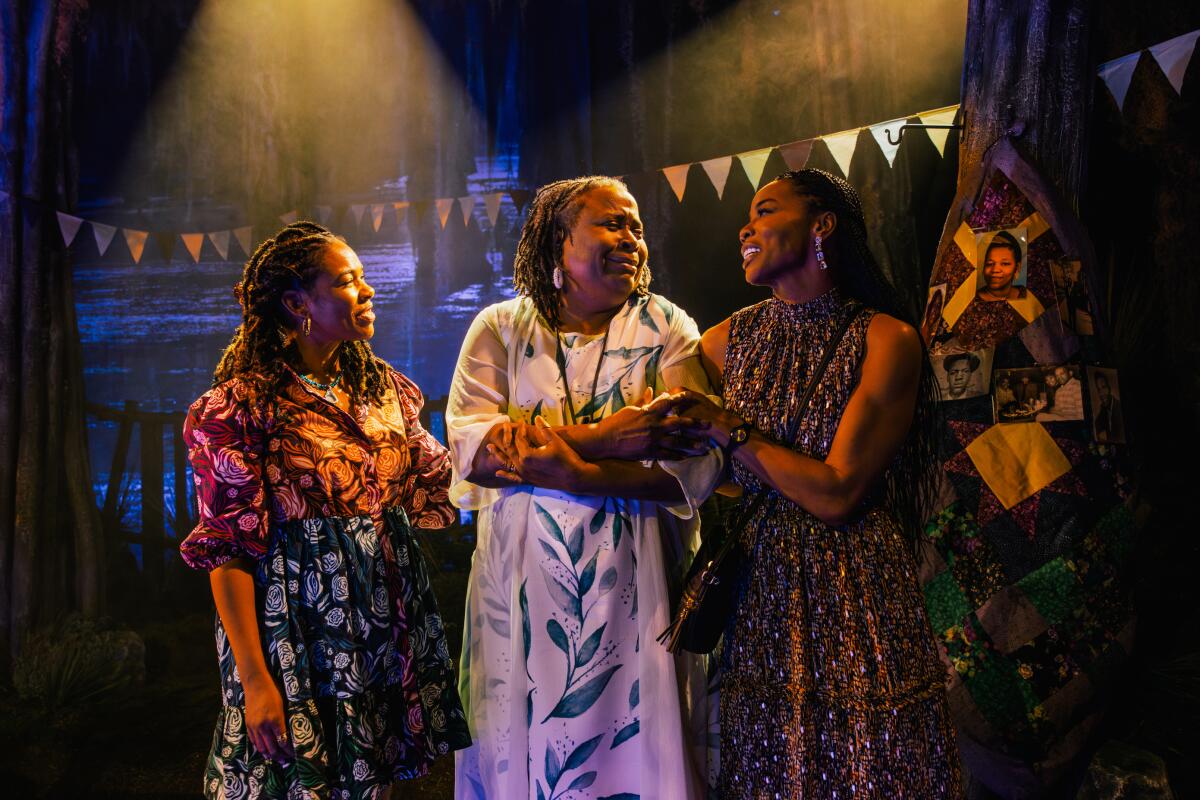
Paranoid, controlling, quarrelsome and rigid, LadyBird turns out to have a traumatic secret of her own. Her behavior and her plot aren’t always in sync, but Evans never lets up in her intensity. RaeMeka, a healer with a more relaxed view on life, has trouble coming into focus. Lewis fills in the vagueness with an earthy humor. Robinson endows Taysha with a knowing quality. It’s precisely what’s needed, but the character’s mystical aura can get heavy-handed at times.
The production as a whole, however, is greater than the sum of its still evolving parts. The cast treats “Black Cypress Bayou” with the reverence it deserves. New work takes time to gestate, and already this play has left a haunting mark.
‘Black Cypress Bayou’
Where: Audrey Skirball Kenis Theater at Geffen Playhouse, 10886 Le Conte Ave., L.A.
When: 8 p.m. Wednesdays-Fridays, 3 and 8 p.m. Saturdays, 2 and 7 p.m. Sundays. Ends March 17
Tickets: $39-$129 (subject to change)
Info: (310) 208-2028 or www.geffenplayhouse.org
Running time: 1 hour, 20 minutes
A new revival of “The Wiz,” featuring Wayne Brady and the hits “Ease on Down the Road” and “Home,” opens at the Hollywood Pantages before its Broadway run.
More to Read
The biggest entertainment stories
Get our big stories about Hollywood, film, television, music, arts, culture and more right in your inbox as soon as they publish.
You may occasionally receive promotional content from the Los Angeles Times.
